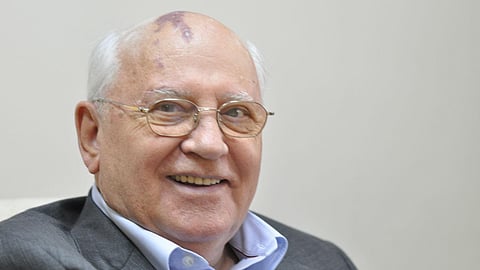A most extraordinary obituary of Mikhail Gorbachev
The last communist president of the Soviet Union, Mikhail Gorbachev died aged 91 in a Moscow clinic on 30 August. One of the last places where one would have expected to read a laudatory obituary to Russia's last communist president would be in South Africa – by a conservative white South African: the chairman of the FW de Klerk Foundation, Dave Steward no less. But then, on second thoughts, having read it, it dawned on me that there were enormous similarities between Gorbachev's Glasnost reformist policies that triggered the unbundling of the Soviet Union (most graphically symbolised by the fall of the Berlin Wall) and that of FW de Klerk, last Afrikaner nationalist president of apartheid South Africa whose reformist policies meant the end of apartheid, and saw South Africa become a multi-racial constitutional democracy where all citizens have equal rights. Read Steward's obituary and decide for yourself. – Martin Welz
In Memory of Mikhail Gorbachev
By Dave Steward*
Few individuals have changed the course of human history more significantly than Mikhail Gorbachev. The glasnost and perestroika reforms that he introduced – which were intended to loosen the sclerotic rigidity of the Soviet state – had consequences that he neither foresaw nor intended. His refusal to revert to the Soviet norm of using force to crush growing dissent in East Germany led to the fall of the Berlin Wall, the liberation of Eastern Europe, and – ultimately – the disintegration of the Soviet Union itself.
Similarly, his decision to extricate the Soviet Union from its increasingly unaffordable involvement in Southern Africa had far-reaching consequences for our region. Together with the fall of the Berlin Wall in 1989, these developments had a major impact on South Africa's transformation process.
Ironically, it was never Gorbachev's intention to abolish Communism. He wanted to reform it – but lost control of the process that he had initiated. He was swept aside by the flood of history and was subsequently blamed by many of his countrymen for the collapse of the Soviet Union and the humiliation of Russia. These factors motivate the dangerous programme of his successor, Vladimir Putin.
In the final analysis, Gorbachev left the world a far better and far freer place than he had found it. The FW de Klerk Foundation extends its deepest condolences to Mikhail Gorbachev's family and friends. He was one of the greatest men of our time.
- Dave Steward is the Chairman of the FW de Klerk Foundation.
Read also:

